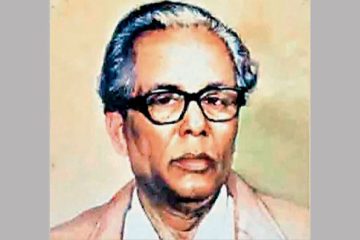Cultural Desk : dhakamirror.com
Today is the 101st anniversary of the birth of the legendary Bengali filmmaker Mrinal Sen.
Born on May 14, 1923 in Faridpur, Mrinal Sen moved to Kolkata to study and became involved in left-wing politics, cultural activities, and film production.
One of the most politically active filmmakers, he, after having studied physics at university in Calcutta, worked as a freelance journalist.
Along with Satyajit Ray and Ritwik Ghatak, Mrinal Sen was a pioneer of what is known as the parallel cinema in India, an alternative to the splashy Bollywood.
In 1955, he made his debut film ‘Raatbhor’, shedding light on a poor village boy’s hazardous experience in a rich urban family, but it did not find instant success. However, his 1960 film ‘Baishe Shraban’ saw the emergence of a more confident, angry voice.
In the ‘70s, Sen made his intentions clear to become a politically-charged filmmaker making his films critiques of the harsh realities of contemporary India and he would not shy away from asking difficult questions.
In his 1976 film ‘Mreegaya’, he attempts to expose how people of tribal origins are exploited by landlords in rural India.
‘Oka Oori Katha’, Sen’s first Telugu film, talked about the esoteric world of two village wastrels. ‘Bhuban Shome’, his breakthrough film, starring renowned Indian actor Utpal Dutt as a lonely bureaucrat who encounters the wife of a ticket collector accused of taking bribes, is a perfect showcase of his directorial ambitions.
Mrinal Sen explored the civil unrest in contemporary Kolkata through his stylistic experiments and fragmented narratives in his Calcutta trilogy—Interview, Calcutta 71, and Padatik.
Middle-class morality is examined in two of Sen’s most-praised films, ‘Ek Din Pratidin’, which portrays a family in despair over a missing daughter, and ‘Kharij’, concerning a family whose servant dies from carbon monoxide poisoning in their home.
‘Kharij’ won the Special Jury Prize at the Cannes Film Festival in 1983. Akaler Sandhane, the story of a film crew documenting the 1943 Bengal famine, won the Silver Bear at the Berlin International Film Festival in 1981.
The eighties and nineties witnessed a mellower but politically vibrant phase of his career. His films were less angry, but they posed larger philosophical questions. Genesis, which starred Om Puri, Shabana Azmi and Naseeruddin Shah, is a parable which talks about freedom and slavery in the form of a love story. Amar Bhuban again talks about the endurance of tolerance in a rapidly divided world.
A recipient of 12 international film awards, for his contribution to film, Sen received many awards, including Dadasaheb Phalke and Padma Bhusan.
Mrinal Sen passed away on December 30, 2018 at the age of 95.





















